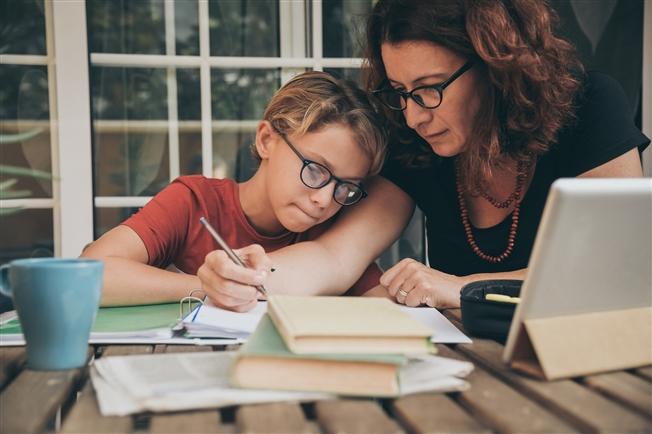How to ease back-to-school anxiety

While some people look forward to all of the changes and routines that come with a new school year, many children, parents, and caregivers quietly struggle with back-to-school anxiety. Back-to-school anxiety is common, and most people experience some level of stress about transitioning away from the carefree days of summer and into the frenzy of fall.
The anxiety that builds as a new school year approaches looks a bit different for everybody, but it can commonly trigger sleeplessness, rumination, and nerves related to all of the forthcoming changes. For example, some children may start avoiding certain school-related activities or engage in negative thinking patterns about what the new school year might hold.
Adriane De Moerloose, M. Ed, an education specialist with Mirmont Outpatient Center, part of Main Line Health, says some kids are prone to catastrophizing, and they will worry about everything from who is in their classes and what their teachers will be like to whether they will be able to navigate the hallways and complete their homework on time. "There are so many worries that creep in," she says. "I find that that negative self-talk and catastrophizing really builds a lot for [children]."
Back-to-school anxiety can occur in anyone. It tends to be more pronounced in middle-school and high-school students, but it can occur in the elementary years as well. "I really think it is something that can happen at any time and at any age," De Moerloose adds.
Here are 7 tips for coping with back-to-school anxiety:
Get organized
De Moerloose says getting organized at the start of the school year can help alleviate back-to-school anxiety. She recommends getting a calendar and encouraging your family members to write down their daily schedules and responsibilities.
By writing this information down and having the ability to go back and look at their schedules, kids will feel ready and prepared to tackle their activities as they head into the new school year. "That eases a lot of anxiety for kids," De Moerloose says.
Make a task list
A task list that you update on a weekly basis can help kids continue to feel prepared as the school year takes off. The list can include things as simple as what time your kids should wake up, brush their teeth, shower, and catch the bus.
By making a list and hanging it in a place where they can look at it as they prepare for the day, kids will be able to stay on track and check items off.
Create an uplifting playlist
For those who struggle with waking up early for school, De Moerloose suggests putting together an uplifting music playlist to get ready to.
"You need some sort of distraction away from [anxiety], because without it, it literally eats you up," De Moerloose says. A positive morning playlist can help put you and the kids in a good mood and alleviate some of your anxiety about the day ahead.
Set up a good sleep routine
A healthy sleep schedule is crucial for kids, especially those with high anxiety. Sleep and mood are closely linked, and research shows that a lack of sleep can worsen anxiety.
To establish a good sleep routine, create a calming bedtime routine and comfortable sleep environment. It's worth silencing phone notifications and putting your devices away about half an hour before bedtime, as social media and alerts can cause significant stress, De Moerloose adds.
Start journaling
Journaling about your worries and concerns about the back-to-school experience can be an effective way to work through your anxiety. De Moerloose recommends taking some time to jot down your emotions as frequently as possible. Studies have shown that journaling can alleviate distress and help people cope with stressors.
If your children tend to internalize their anxieties, you can try encouraging them to journal about their experiences. Then, if they're open to it, they can share the journal with you. "Sometimes, that's a good way to start a communication process, and it's a great way for a parent to check in," De Moerloose says.
Find a trusted adult
Encourage your children to find a trusted adult at school, whether that be a teacher or guidance counselor, who they can lean on for support during the school day. Though many children are resistant to finding a trusted adult at school, it can really help them navigate and cope with daily stressors.
"There's always going to come a point in time where you need someone that you can truly trust in the school setting," De Moerloose says.
Advocate for yourself
Finally, encourage your children to advocate for themselves at school. All too often, De Moerloose sees parents communicate their children's concerns, which prevents the kids from learning how to problem solve and grow as people. Admitting that you are confused or stressed and reaching out for help is a powerful way to cope with day-to-day stressors at school.
"Understand that asking for help is not a negative. That's a part of self-advocating," De Moerloose adds.
Mirmont Outpatient Centers in Broomall, Exton and Media provide treatment for mental health diagnoses and substance use disorders. Services include psychiatric evaluation and medication management, individual and group psychotherapy, an intensive outpatient program and a partial hospitalization program, with specialty services for adolescents and adults.
Call us at 1.888.CARE.898 (227.3898) to schedule a confidential appointment and ask any questions.
 Content you want, delivered to your inbox
Content you want, delivered to your inbox
Want to get the latest health and wellness articles delivered right to your inbox?
Subscribe to the Well Ahead Newsletter.
